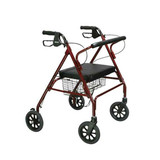
Learning To Be a Caregiver for a Loved One: The Cost of Caregiving
A metric that we don’t often think about is life expectancy. With the massive advances made in medicine and an overall improvement in the way we live, life expectancy has increased substantially over time. To put it in perspective, the global average life expectancy in 1900 was 29 years. In 1950, it was 46 years and in 2019 it was almost 73 years.
Another interesting statistic is that the average age of the global population is also increasing rapidly. In 1990, around 6% of the global population was aged 65 or older. This grew to 9% in 2019 and is projected to reach 16% by 2050.
That said, however, adult care is not something that many people give much thought to or spend time preparing for. We know that the people we love will get older and eventually need help. But rarely do we understand the depth and breadth of responsibilities caregivers undertake.
Caring for an elderly person is a noble thing, whether it’s a family member or an institutional patient. On the flip side, though, caring for someone comes at a cost. And, there are several types of costs associated with deciding to personally care for our elderly family and friends.
Time Costs
On average, caregivers spend a little over 24 hours per week caring for a loved one. In one in four cases, this goes up to more than 40 hours per week. Few adult care providers actually even realize all of the time they spend on caregiving. In some cases, they lose track of the time because they are doing routine home chores like washing dishes or cleaning.
There are many care activities that, individually, we may not see as much of a burden or as time thieves. Things like running errands, grocery shopping, or medical assistance in the form of rides to doctor’s appointments, filling out and planning medications for the week, or even consulting with physicians to determine care plans.
In many cases, caregivers also help loved ones with self-care such as washing, dressing or using the restroom. All of these small responsibilities add up and are a cost a caregiver must be prepared to handle. While 24 hours a week may not sound like much, rest assured, it is a big sacrifice. And it is one that most caregivers make day in and day out for several years.
Emotional Costs
Adult caregivers often find that they pay an emotional toll as well. The most basic form of emotional detriment is from stress. Whether you are worrying about your loved one’s health or worrying about how to provide proper care while balancing your other responsibilities, being a caregiver can be stressful.
In addition, because of the time commitment necessary for caring for a loved one, you may also struggle with fatigue or exhaustion. Alzheimer’s or dementia patients may add another level of stress to caregiving because it can be difficult to communicate with them.
The emotional cost of caregiving is not something to be taken lightly. A report published by Simmons University quotes the following observations drawn from US Department of Health and Human Services data:
· The depression rate among caregivers is more than double the national rate.
· Two out of three caregivers neglect their own health because their patient’s needs come first.
· More than half of the caregivers surveyed reported having too little time to take care of themselves, and almost the same number said they’re just too tired to bother.
· One in two carers said that their health deteriorated, and this affected their ability to properly care for someone else.
· A report published in the Journal of the American Medical Association suggests that older spouses who suffered emotional strain due to caregiving had a 63 percent higher mortality rate than older adults who weren’t caregivers.
The long-term effects of this continual emotional stress are far more dangerous than people may think. The stress builds up and eventually overcomes even the strongest people. As a caregiver, you should be aware of these emotional costs and have plans in place for how to deal with them healthily. If you need further information or advice, visit the Family Caregiver Alliance website.
Monetary Costs
Of course, when we talk about the cost of anything, the first thing that comes to mind is money. There is a very real direct and indirect cost to
caregiving. Many people choose to self-care for adult family members because they do not want to pay the high prices associated with professional help. However, family caregivers usually face a substantial and unavoidable financial cost as well.
Depending on your personal family situation, you may need to reduce working hours in order to accommodate your caregiving responsibilities. In addition, there may be costs associated with adjusted living spaces and added accessibility. You may also find yourself paying out of pocket for groceries, household goods, or adult care necessities.
According to AARP (formerly the American Association of Retired Persons) the average cost of caregiving is more than $600 per month. A Simmons University publication reports that the annual cost of private caregiving in the US runs to more than $500 billion.
It is important that caregivers plan for these costs and work out how to handle the expenses associated with caregiving early on. If you do not have a plan in place, you will likely only run into bigger issues down the road.
Conclusion
As we have seen, providing adult care carries a substantial burden of costs. Adult caregivers are commonly faced with time, money, and emotional sacrifices. At LL Medico, we understand the challenges that you have undertaken as a caregiver, and we are ready, willing and able to help. Our mission is to provide you with the best quality adult care necessities at the lowest possible prices. Our comprehensive range of adult care products includes all your requirements for incontinence, personal care, and mobility problems. Have a look around our website to see what we offer. And, if you need any assistance, our experienced assistants are just a call or email away.















































































































































